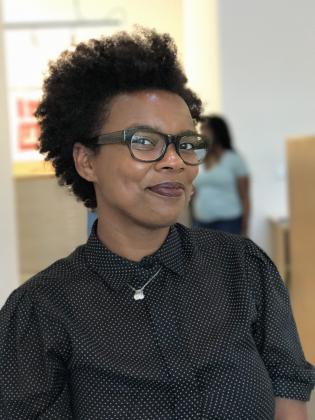Berkeley African American Studies awarded $2.8 million grant to expand community impact
Andrew W. Mellon Foundation “Just Futures” award aims to increase the collective understanding of America’s history
January 15, 2021

Ula Taylor is the chair of the Department of African American Studies at UC Berkeley which recently received $2.8 million from the Andrew W. Mellon Foundation which will fund the “Black Studies Collaboratory” project. (UC Berkeley photo by Kirpa Singh)
What is the role of Black studies in building a more just future? What lessons from Black feminist, radical and intellectual traditions can we apply to this moment in history? And how do we solidify our commitment to Black studies as a public good?
Answering those questions will be the focus of the “Black Studies Collaboratory,” a project led by UC Berkeley’s African American Studies Department with the support of a new $2.8 million grant from the Andrew W. Mellon Foundation.
The three-year-long project aims to take Black studies research outside of the classroom and into the local community and greater public discourse. Led by Berkeley African American Studies Professors Leigh Raiford and Tianna S. Paschel, the project will organize academic think tanks, provide summer labs for graduate students, and award research grants for African American studies faculty and students that will increase the scope and impact of the department’s scholarship.

Leigh Raiford is associate professor of African American Studies at UC Berkeley, where she teaches and researches about race, gender, justice and visuality. (UC Berkeley photo)
Research from the project, focused on topics like prison abolition and global Black feminism, will translate into a one-unit Black studies course open to the public in spring 2023.
“Our department has always had large scholarly visions that stretch beyond the formal academy to embrace artists and organic intellectuals whose work is equally significant to the mission of Black studies,” said Ula Taylor, Professor and H. Michael and Jeanne Williams Chair of African American Studies. “The financial support from Mellon will increase our capacity to do the transformative work that is vital to this cross fertilization.”
As part of the Mellon Foundation’s Just Futures Initiative, the grant is one of 16 awarded to universities across the nation in a collaborative effort to address racial inequality through bold and unique humanities-based research projects that seek to expand the collective understanding of America’s history.
Raiford, who will serve as the Black Studies Collaboratory program director, said the events of the last year have prompted an unprecedented social awakening to questions of racial justice, leading to an increased demand for insights from Berkeley’s African American Studies experts.
“Black Studies at its heart is a life-affirming field centered in Black humanity,” said Raiford. “Among our goals for the Black Studies Collaboratory is to provide space for critical engagement and collaborative dreaming, and to create opportunities for joyful and generative engagement among Black faculty, students, staff, the surrounding community and around the country.”

Tianna Paschel is an assistant professor in the Department of African American Studies UC Berkeley. She researches the intersection of racial ideology, politics, and globalization in Latin America. (Photo courtesy of Tianna Paschel)
“This is an opportunity to experiment with new forms of collaboration, engage in new conversations around freedom, justice and joy, and to deepen our roots in the Bay Area,” Paschel added. “We hope that this initiative helps to further cement our mark on Black studies, and Black studies’ importance in the world.”
African American Studies Ph.D. candidate Ra Malika Imhotep has conducted research on topics such as Black feminism and diasporic performance and has stayed active as a leader in the campus community, helping to organize events such as the Empowering Womxn of Color Conference.
Imhotep said Black studies has been an essential passion in her life and that it was a field of study created in the 1960s Bay Area desired by students across the country seeking community and acknowledgement.
This grant-funded project, Imhotep said, can help students get back to those roots.
“While the work in the classroom is very important, we’re not fulfilling the vision of the folks who campaigned for, and protested for, Black studies programs if we are solely doing work within academia,” said Imhotep. “They always had a vision that included the community. They wanted for the space of Black studies to be a space that challenged societal norms and impacted the communities that we study. I think this grant is an opportunity for our department to radically return to those beginnings with financial support.”

Berkeley African American Studies Ph.D. candidate Ra Malika Imhotep will help to host the Black Studies Collaboratory Critical Conversations speaker event with visiting writer Alice Walker. (Photo courtesy of Ra Malika Imhotep)
The project launches this spring with the “Critical Conversations” speaker series that will celebrate the life and legacy of Barbara T. Christian, an architect of Black feminist criticism and a founding member of Berkeley’s African American Studies Department.
Speakers will include novelist and social activist Alice Walker, cultural theorist and poet Fred Moten, and community organizer and prison abolitionist advocate Mariame Kaba.
“These are times that call for precisely the sort of intellectual and community engagement around racial justice that the Black Studies Collaboratory proposes,” said Berkeley’s Social Sciences Dean Raka Ray. “We look forward to supporting and amplifying this important work, which ties in with Berkeley’s democracy multidisciplinary theme, over the next three years of this grant, and beyond.”
Chancellor Carol Christ added, “The project will take this critical moment in our history as an invitation to reimagine African American Studies’ relationship to the institution of the university and in turn reimagine the institution’s relationship to its surrounding Black communities.”